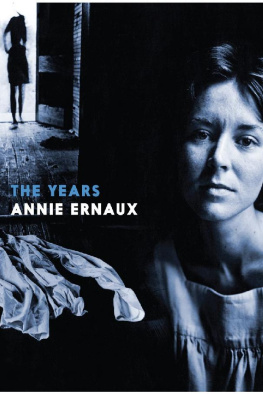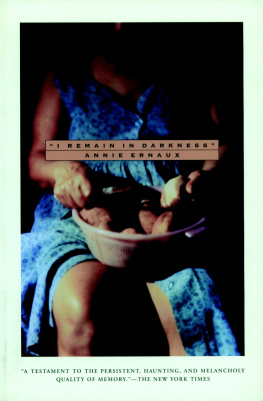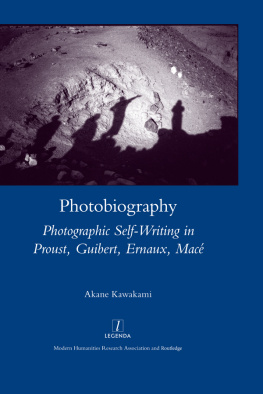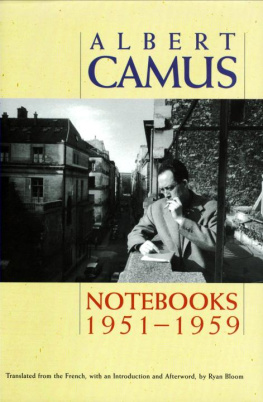THE YEARS
ANNIE ERNAUX
Translated by
Alison L. Strayer
SEVEN STORIES PRESS
New York Oakland London
Copyright 2008 by ditions Gallimard
English translation copyright 2017 by Alison L. Strayer
All rights reserved. No part of this book may be reproduced, stored in a retrieval system, or transmitted in any form, by any means, including mechanical, electronic, photocopying, recording, or otherwise, without the prior written permission of the publisher.
Seven Stories Press
140 Watts Street
New York, NY 10013
http://www.sevenstories.com
Library of Congress Cataloging-in-Publication Data
Names: Ernaux, Annie, 1940- author. | Strayer, Alison L., translator.
Title: The years / Annie Ernaux ; translated by Alison L. Strayer.
Other titles: Annes. English
Description: First edition. | New York : Seven Stories Press, 2017. | First
published in French as Les Annes (Paris : Gallimard, c2008).
Identifiers: LCCN 2017003723 (print) | LCCN 2017023091 (ebook) | ISBN
9781609807887 (E-book) | ISBN 9781609807870 (paperback)
Subjects: LCSH: Ernaux, Annie, 1940- | Authors, French--20th
century--Biography. | BISAC: BIOGRAPHY & AUTOBIOGRAPHY / Personal Memoirs.
| HISTORY / Europe / France. | HISTORY / Social History.
Classification: LCC pq2665.r67 (ebook) | LCC pq2665.r67 z4613 2017 (print) |
ddc 843/.914 [B] --dc23
LC record available at https://lccn.loc.gov/2017003723
College professors and high school and middle school teachers may order free examination copies of Seven Stories Press titles. To order, fax on school letterhead to (212) 226-1411 or visit www.sevenstories.com.
All we have is our history, and it
does not belong to us.
Jos Ortega y Gasset
Yes. Theyll forget us. Such is our fate, there is no help for it. What seems to us serious, significant, very important, will one day be forgotten or will seem unimportant. And its curious that we cant possibly tell what exactly will be considered great and important, and what will seem petty and ridiculous [...]. And it may be that our present life, which we accept so readily, will in time seem strange, inconvenient, stupid, not clean enough,
perhaps even sinful...
Anton Chekhov
Translated from the Russian by Constance Garnett
(New York: Macmillan, 1916)
Preface
All the images will disappear.
the woman who squatted to urinate in broad daylight, behind the shack that served coffee at the edge of the ruins in Yvetot, after the war, who stood, skirts lifted, to pull up her underwear and then returned to the caf
the tearful face of Alida Valli as she danced with Georges Wilson in the film The Long Absence
the man passed on a Padua sidewalk in the summer of 1990, his hands tied at the shoulders, instantly summoning the memory of thalidomide, prescribed to pregnant women for nausea thirty years before, and of a joke people told later: an expectant mother knits the babys layette while gulping thalidomide pills at regular intervalsa row, a pill, a row, a pill. A friend says in horror, Stop, dont you realize your baby may be born without arms, and the other answers, Its okay, I dont know how to knit sleeves anyway
Claude Piplu who leads a regiment of lgionnaires, waving a flag in one hand and leading a goat with the other, in a film with Les Charlots
the majesty of the elderly woman with Alzheimers, who wore a flowered smock like all the residents of the old folks home, but with a blue shawl over her shoulders, tirelessly pacing the corridors, haughty like the Duchess of Guermantes in the Bois de Boulogne, and who made you think of Cleste Albaret as shed appeared one night on television with Bernard Pivot
on an outdoor stage, the woman shut into a box pierced all the way through by men with silver spearsand emerging alive because it was a magic trick, called The Martyrdom of a Woman
the mummies clothed in tattered lace, dangling from the walls of the Convento dei Cappuccini in Palermo
Simone Signorets face on the poster for Thrse Raquin
the shoe rotating on a pedestal in an Andr store, rue du Gros-Horloge in Rouen, the same phrase continuously scrolling around it With Babybotte, Baby trots and grows well
the stranger of Termini Station in Rome, who half lowered the blind of his first-class compartment and in profile, hidden from the waist up, dandled his sex for the young women in the train on the opposite track, who leaned against the railing, chins in hands
the guy in a cinema ad for Pac Vaisselle dishwashing liquid, cheerfully breaking dirty dishes instead of washing them while an offscreen voice sternly intoned That is not the solution! and the fellow, gazing at the audience in despair, asked But what is the solution?
the beach at Arenys de Mar, next to a railway line, the hotel guest who looked like Zappy Max
the newborn flailed in the air like a skinned rabbit in the delivery room of the Clinique Caudran Pasteur, found again half an hour later, dressed and sleeping on his side in a little bed, one hand outside, and the sheet pulled up to his shoulders
the dashing figure of the actor Philippe Lemaire, married to Juliette Greco
in a TV commercial, the father who hides behind his newspaper, trying in vain to toss a Picorette in the air and catch it in his mouth, like his little girl
a house with an arbor of Virginia creeper, which was a hotel in the sixties, no. 90A, on the Zattere in Venice
the hundreds of petrified faces, photographed by the authorities before deportation to the camps, on the walls of a room in the Palais de Tokyo, Paris, in the mid-1980s
the lavatories built above the river, in the courtyard behind the house in Lillebonne, the feces mixed with paper gently borne away by the water that laps around them
all the twilight images of the early years, the pools of light from a summer Sunday, images from dreams in which the dead parents come back to life, and you walk down unidentifiable roads
the image of Scarlett OHara, who kills a Yankee soldier and drags him up the stairs, then runs through the streets of Atlanta in search of a doctor for Melanie, who is about to give birth
of Molly Bloom, who lies next to her husband, remembering the first time a boy kissed her and she said yes yes yes
of Elizabeth Drummond, murdered with her parents on a road in Lurs in 1952
the images, real or imaginary, that follow us all the way to sleep
the images of a moment, bathed in a light that is theirs alone
They will vanish all at the same time, like the millions of images that lay behind the foreheads of the grandparents, dead for half a century, and of the parents, also dead. Images in which we appeared as a little girl in the midst of beings who died before we were born, just as in our own memories our small children are there next to our parents and schoolmates. And one day well appear in our childrens memories, among their grandchildren and people not yet born. Like sexual desire, memory never stops. It pairs the dead with the living, real with imaginary beings, dreams with history.
Thousands of words will suddenly be deleted, the ones that were used to name things, faces, acts and feelings, to put the world in order, make the heart beat and the sex grow moist.
slogans, graffiti in public toilets, on walls in the street, poems and dirty stories, titles
anamnesis, epigone, noema, theoretical, the terms written in a notebook with their meanings so you didnt need to look them up each time
turns of phrase that others used without a thought and which we doubted wed ever be able to use, il est indniable que , force est de constater








